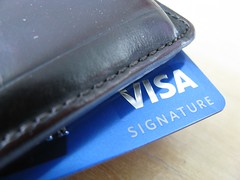Everybody knows they need an emergency fund. Right? Right. There’s some argument about how much to keep in your emergency fund, but the general rule is no less than $1000 and ideally 6-12 months of expenses. And common savings strategies says that you should keep that money in a nice comfy savings account that you can access as needed. But, let me play devils advocate for a minute here. Let’s say you had $1000 in your emergency fund. What could you do with that $1000 if it were freed up and spendable? What if, instead of having your emergency fund in a savings account, you used a credit card that had no balance on it?
You read that right. A credit card.
Take you’re average credit card with a $1000 to $5000 credit limit (higher if needed) and keep no balance on it. You’ve got a ready made source of funds, up to the limit, that you can access from just about anywhere. And, it frees up your emergency fund savings to pay down debt. Or invest. Or, you can still keep it in a savings if you want and just use the credit card to supplement the emergency fund so you don’t have to keep such a high balance on it.
Pros and Cons (My wife likes these lists and always makes me write one when making big decisions…)
Let’s look at the pros for using a credit card as an emergency fund.
- Cash is freed up for investing/paying down debt. Why earn 1% on your emergency fund cash when you could be paying off debt that you’re paying 10% or more on? Or, that you could be investing and possibly earning a nice return on?
- No balance needed. The card would be dedicated to the emergency use, so you wouldn’t carry a balance on it unless you had an emergency.
- Available anywhere. You can instantly access your emergency fund from anywhere your card is accepted. Which is virtually anywhere.
Now, let’s look at the cons for using a credit card as an emergency fund.
- Card could be closed. If you don’t carry a balance and never need it, there’s a chance that the card company could close your account and you wouldn’t be able to use it when you needed it. There are ways around that. You could use it for a specific bill each month and then pay it off just like you would if you were paying the bill normally. Problems could arise if you don’t pay that balance though and fill up the card. Then you wouldn’t be able to use it either.
- Interest charges. Nobody likes paying interest on anything. If the emergency is big enough and bad enough that you aren’t able to pay it off right away, you’ll start racking up interest. That can lead to a quick spiral into the same debt boat that you were in to begin with. Or worse.
I don’t know if I could recommend using a credit card as your only means of an emergency fund. But, I think you could make a pretty good argument for using one to supplement your current emergency fund. Let’s say your goal is to have 3 months expenses in your emergency fund. And that your expense are $5000 a month. That’s $15000 that will just be sitting in a bank doing nothing more than earning 1% interest. If you’ve got a card with a $10000 limit on it, you could pare that down to just $5000 in the bank and use the other $10000 to pay off a bill. Or invest in something.
I think the biggest problem with using a method like this is the potential pitfalls. If you are unable to keep the card active and balance free, you’ll have problems using it when you need it. If you do need it and are able to use it, but not pay it off, you could potentially end up in the deep water again. On the other hand, if you use up a cash emergency fund, you still need to pay it off, but you won’t have to pay interest on the part you used.
Using a credit card as an emergency fund is doable. But, I can’t suggest it for any but the most disciplined. One wrong step, and you could end up having more of an emergency than you would have normally if you just had a cash emergency fund. And that could lead to disaster.
What do you think?
Now, I want to know your opinion. Would you consider using a credit card as part (or whole) of your emergency fund? What about using a line of credit as an emergency fund source? Would higher interest rates on savings change your mind? What pros and cons did I miss?

I started this blog to share what I know and what I was learning about personal finance. Along the way I’ve met and found many blogging friends. Please feel free to connect with me on the Beating Broke accounts: Twitter and Facebook.
You can also connect with me personally at Novelnaut, Thatedeguy, Shane Ede, and my personal Twitter.


